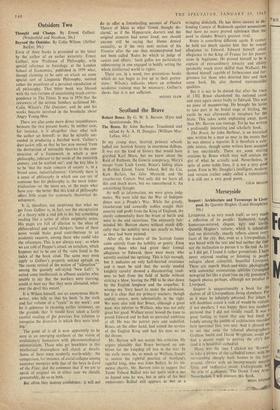Outsiders Two
Thought and Change. By Ernest Gellner. (Weidenfeld and Nicolson, 30s.) EACH of these books is presented as the latest by the author of an earlier notoriety. Ernest Gellner, now 'Professor of Philosophy, with special reference to Sociology, at the London School of Economics,' published in 1959 what, though claiming to be only an attack on some special sort of Linguistic Philosophy, seemed rather the manifesto of a personal repudiation of
all philosophy. That bitter book was blessed with the rare fortune of occasioning much corres- pondence in The Times. It was in 1956 that the reviewers of the serious Sundays acclaimed Mr. Colin Wilson's The Outsider; and he and his works became involved in the brouhaha about Angry Young Men.
There are also some more direct resemblances between the two present books. In neither case, for instance, is it altogether clear what task the author set himself; or that he actually suc- ceeded in producing a finished work. Gel'flees dust-jacket tells us that he has now moved 'from the destruction of untenable theories to the con- struction of a framework in which a new philosophy, relevant to the needs of the twentieth century, can be worked out'; and the key idea is to be 'that the main concern of society is, in a broad sense, industrialisation.' Certainly there is a sense of philosophy in which one can say of someone that his philosophy is, the more indus- trialisation—or the more sex, or the more what have you—the better. But this kind of philosophy offers little scope for systematic theoretical de- velopment.
It is, therefore, not surprising that what we get from Gellner is, in fact, not the excogitation of a theory with a real job to do, but something reading like a series of often enigmatic notes. His pages are full of allusion to the ideas of philosophical and social thinkers. Some of these notes would make good contributions to an academic causerie, among those who could take the references. This is not always easy: as when we are told of Popper's attack on serialism, which happens not to be one of the -isms listed in the index of the book cited. The same may even apply to Gellner's properly unkind epitaph on 'the recent revival of the notion of "alienation"' among the quaintly self-styled 'New Left'; 'it suited some intellectuals in affluent societies who, unable to say that the workers were starving, could at least say that they were alienated, what- ever the devil this meant.'
It is Wilson himself, not an anonymous blurb- writer, who tells us that his book 'is the sixth and last volume of a "cycle" in my work'; and he is generous in excusing earlier reviewers, on the grounds that 'it would have taken a fairly careful reading of ihe previous five volumes to recognise the direction in which they were tend- ing.'
The point of it all is now apparently to be seen in an emerging synthesis of the vision of evolutionary humanism with phenomenological existentialism. Those who get breathless in this intellectual stratosphere will clutch at details. Some of these seem modestly worth-while: the comparison, for instance, of social collapse among castaway monkeys with that of the boys in Lord of the Flies; and the comment that if we are to speak of original sin in either case we should, presumably, do so in both.
But often they destroy confidence: it will not
do to offer a freewheeling account of Plato's Theory of Ideas as what 'Greek thought de- clared,' as if the Hippocratic doctors and the original atomists had never lived; nor should anyone still be saying that Hume denied causality, as if the very next section of his Treatise after the one thus misinterpreted had not been called 'Rules by which to judge of causes and effects.' Such gaffes are particularly unbecoming in one engaged in boldly setting the whole intellectual world to rights.
These are, in a word, two pretentious books which do not begin to live up to their preten- sions: Wilson's indicates where an orthodox academic training may be necessary; Gellner's shows that it is not sufficient.
ANTONY FLEW


































 Previous page
Previous page